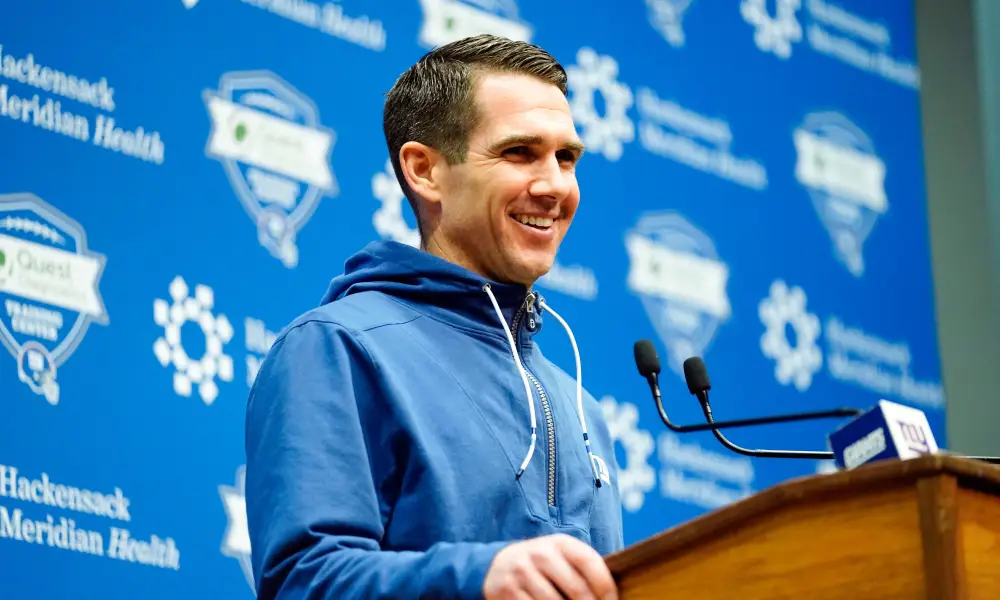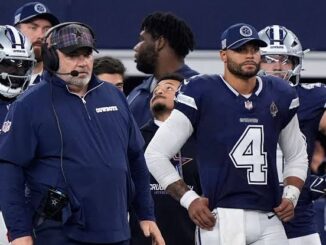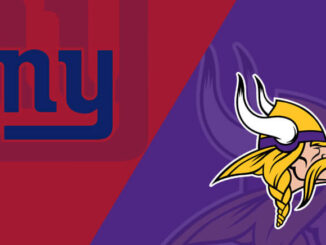
**Giants General Manager Explains Why Three Quarterbacks Should Be Kept Available on the Team**
In the high-stakes world of NFL roster management, few decisions are as scrutinized as those involving the quarterback position. This is especially true for the New York Giants, a franchise that has historically been known for its strategic maneuvers both on and off the field. Recently, the Giants’ General Manager, Joe Schoen, shed light on a strategic decision that has sparked considerable discussion among fans and analysts alike: the decision to keep three quarterbacks available on the roster. This choice may seem unconventional to some, but Schoen’s reasoning provides a comprehensive understanding of its significance and impact.
**1. The Value of Depth**
One of the primary reasons Schoen advocates for retaining three quarterbacks is the critical importance of depth at the position. Injuries are an inevitable part of the game, and the quarterback is particularly vulnerable due to the physical demands placed upon them. By keeping a third quarterback on the roster, the Giants ensure that they have a reliable backup in case both the starter and the primary backup are unavailable. This approach minimizes the risk of being forced to rely on a less experienced player or, worse, a practice squad member with little to no game experience.
**2. Enhancing Game Preparation and Flexibility**
Another key reason for maintaining three quarterbacks is the flexibility it offers in game preparation. Each quarterback brings a unique set of skills and attributes to the field, and having multiple options allows the coaching staff to tailor their game plans more effectively. For instance, if the starting quarterback is known for his mobility and quick release, the team might face challenges if they need to adjust their strategy against a particularly strong defensive line. In such cases, having a backup quarterback with a different skill set—such as a stronger arm or more experience in certain situations—can be invaluable.
**3. Developing Young Talent**
Schoen also highlighted the developmental aspect of keeping three quarterbacks on the roster. The third quarterback is often a young player or a recent draft pick with potential but limited experience. Providing this player with opportunities to practice with the first-team offense and participate in game situations, even if only as a backup, accelerates their development. This approach not only builds a stronger future pipeline but also gives the team a chance to evaluate and groom potential future starters.
**4. Mitigating Risk in High-Stress Situations**
The NFL is known for its high-pressure situations, and the quarterback position is often at the epicenter of these moments. Keeping three quarterbacks available ensures that the team is better equipped to handle unforeseen circumstances. For example, if the starter is injured during a critical game or if the primary backup struggles under pressure, having a third quarterback ready to step in provides an added layer of security. This risk mitigation strategy can be crucial in maintaining team performance and stability throughout the season.
**5. Strategic Game Management**
In some cases, teams might employ different quarterbacks for specific game scenarios. For instance, one quarterback might be more adept at managing a two-minute drill, while another might excel in longer, sustained drives. By having three quarterbacks on the roster, the Giants can more effectively manage these game situations and adapt their strategy based on the flow of the game. This strategic flexibility can be a significant advantage in tight or high-stakes games.
**6. Learning from Recent Trends**
Schoen also pointed out that recent trends in the NFL have influenced the decision to keep three quarterbacks. The increasing frequency of injuries to key players, coupled with the rise in the complexity of defensive schemes, has made it more challenging for teams to rely solely on two quarterbacks. Observing these trends and adapting accordingly helps the Giants stay ahead of the curve and maintain a competitive edge.
**7. Balancing Roster Space and Resources**
One of the common criticisms of keeping three quarterbacks is the potential impact on roster space and resource allocation. However, Schoen and his team have carefully evaluated this aspect and believe that the benefits outweigh the drawbacks. By balancing the roster and making strategic decisions about which positions to prioritize, the Giants can ensure that they have the necessary depth without compromising the overall strength of the team.
**8. Team Chemistry and Leadership**
The quarterback position is not just about on-field performance; it’s also about leadership and team chemistry. Having three quarterbacks on the roster allows for a diverse mix of personalities and leadership styles, which can positively impact the team dynamic. This diversity can foster a more cohesive team environment and provide different perspectives and approaches to game situations.
**9. Future Planning and Cap Management**
Finally, Schoen discussed how keeping three quarterbacks aligns with the team’s long-term planning and salary cap management. By developing and evaluating young quarterbacks, the Giants can make more informed decisions about future contracts and roster moves. This approach helps manage the team’s salary cap more effectively and ensures that they are prepared for future transitions at the quarterback position.
**Conclusion**
In summary, Joe Schoen’s explanation for keeping three quarterbacks available on the Giants’ roster reflects a thoughtful and strategic approach to managing the most crucial position in football. The decision underscores the importance of depth, flexibility, and future planning, while also addressing the realities of injuries and the evolving nature of the game. By maintaining three quarterbacks, the Giants are not only safeguarding themselves against unforeseen circumstances but also investing in the long-term success and stability of the team. This decision exemplifies a forward-thinking mindset that prioritizes both immediate and future needs, ultimately aiming to build a stronger, more resilient franchise.



Be the first to comment